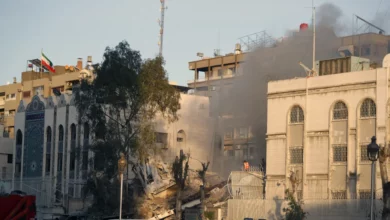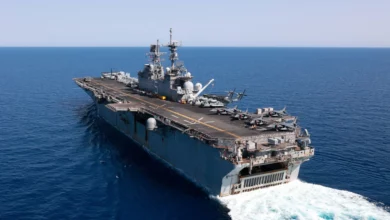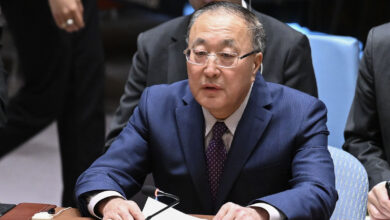
The leader of Al-Qaeda's Syrian wing tried unsuccessfully at a recent meeting to convince rival Islamist factions to merge into one unit, several insurgency sources have told Reuters.
Abu Mohamad al-Golani, head of the Nusra Front, even suggested he was willing to change the name of his group if the others, including the powerful Ahrar al-Sham organization, agreed to the deal, the sources said.
But he made clear that Nusra would not cut its ties with Al-Qaeda, and its allegiance would remain to Ayman al-Zawahri, who took over as leader after US Navy SEALS killed Osama bin Laden in 2011.
Much was riding on the outcome of the meeting, which the sources said took place about 10 days ago.
Nusra and Ahrar al-Sham are the most powerful groups in northern Syria: when they briefly teamed up with other Islamists last year in an alliance called the Fatah Army, the rebels scored one of their biggest victories by seizing the city of Idlib.
Some rebels believed a merger would create a stronger rival to Islamic State and might attract much-needed military support and recognition from regional and international powers.
But the leaders left without an agreement, and the sources said the atmosphere was tense, with Nusra blaming Ahrar al-Sham for the failure.
A few days later, members of the two groups clashed in the towns of Salqin and Harem in Idlib province, near the border with Turkey. Several fighters were killed on both sides, but other insurgent groups brokered a quick ceasefire.
Jihadi sources, including some from Ahrar al-Sham, say it is only a matter of time before another battle between the two erupts. They say the rift between them is getting deeper, although mediation continues. One restraining factor has been an imminent assault by the Syrian army and its allied forces in northwestern Syria.
"The situation is charged, the failure of initiatives could cause an explosion," said a jihadi in Idlib who is close to the two groups. "What happened just avoided all-out conflict, all-out battle. But it will be hard to tell what will happen in the future."
Outright war between Nusra and Ahrar al-Sham would still further complicate the five-year Syrian conflict, in which rebel groups are mushrooming under different slogans and sometimes fighting each other.
A delegation from Syria's main opposition group, the Saudi-backed Higher Negotiation Committee (HNC), arrived in Geneva on Saturday to join United Nations-mediated peace talks, demanding President Bashar al-Assad's government be made to comply with a UN resolution on humanitarian aid and human rights.
Nusra and Islamic State – designated as terrorists by the UN – have been excluded from the Geneva talks, the first attempt in two years to end a war that has killed a quarter of a million people. Ahrar al-Sham, which presents itself as a Syrian nationalist force in contrast to Al-Qaeda's global jihadist ideology, recently joined the HNC but Russia opposes its participation in the talks.
Lack of trust
Distrust between Nusra and Ahrar is mutual. Nusra accuses its Islamist rival of being a front for Turkey, addressing not the "interests of Muslims" but the agenda of Ankara in order to be part of a future political deal to rule Syria.
Ahrar and other groups are pushing Nusra to cut its ties with Al-Qaeda as a step towards becoming more fully engaged in the struggle against Assad.
"The problem is with the Qaeda link and its ideological implications. Nusra insists on its agenda, it doesn't want to maneuver at all," said a frustrated Ahrar commander, accusing it of "damaging the revolution".
In the first few weeks after last year's capture of Idlib, the two groups divided responsibilities and territory without problems. But gradually divisions began to surface, as Ahrar and other insurgents became wary of Nusra and accused it of trying to seize power and sidelining them.
"Nusra cannot work with others, they have a dominating project, they do not accept the others," said a fighter from Ahrar al-Sham in Idlib via the Internet.
Some insurgents are suspicious of Nusra's long-term agenda in the region and globally, distrusting its declaration that it has no ambitions outside Lebanon and Syria.
"This declared goal is an interim one. After it wins and establishes itself in Syria, they will move to the next step, which objects to the goal of the revolution," said an Islamist rebel who is allied with Ahrar al-Sham.
"They will join the global jihad and this is against our revolution. Our revolution is limited to Syria."
No jeans
On the ground, Nusra imposes strict Islamic rules in villages and towns where it shares power. It has banned women from wearing make-up, showing their hair or wearing tight clothes like jeans, and applied a policy of segregation between the sexes. All these moves have served to assert its dominance, while provoking other groups.
"There is no group on the ground that actually objects to having an Islamic government but the implementation and methods are different," said another Islamist fighter from a group that is allied with Ahrar.
Highlighting the dilemma facing Syrian rebels, a local commander of an Islamist brigade that works closely with Ahrar al-Sham said: "It will be difficult for Nusra to disengage from Qaeda and it will be difficult for us to work with them. The situation is really difficult. Things are complicated and interlocked all together."
Asked how long the groups could avoid hostilities, an Ahrar al-Sham military commander said: "We can avoid fighting with Nusra for now. For how long? That is a difficult question. Only God knows."




